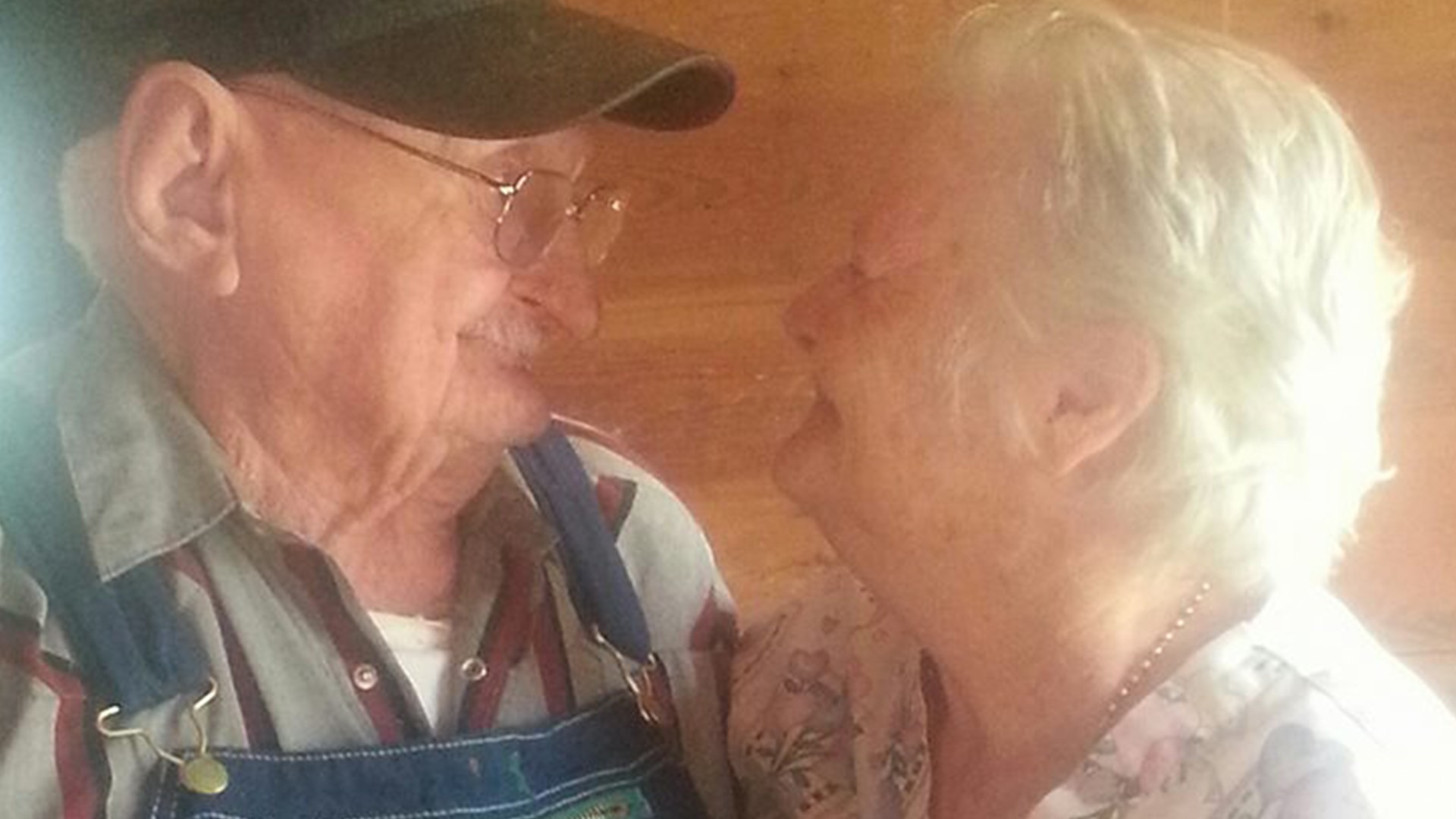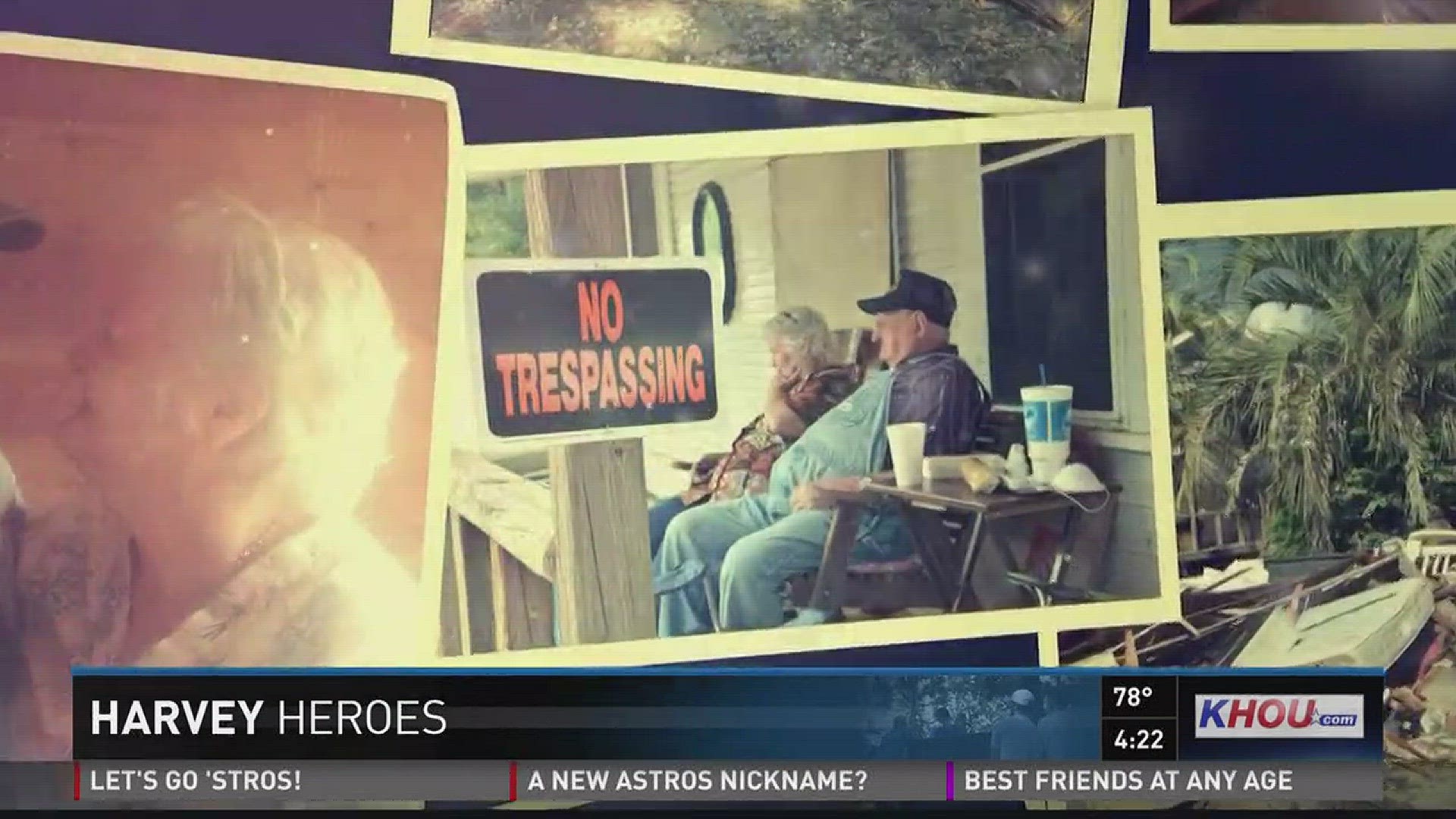THE SMELL OF warm coffee fills the room as Joyce Romero settles into a chair at her kitchen table, letting out an exasperated sigh. The day ahead weighs heavy on her. It’s been a long 18 months filled with stress and heartache brought on by Hurricane Harvey. But this day, perhaps, is going to be the most difficult of all.
More difficult than when five feet of floodwater came into her home, destroying almost everything inside, and forcing herself and her husband to evacuate. Harder than the nomadic life they lived for the months afterwards. Worse than watching the demolition of their house, lifetimes of memories turned to rubble.
Today, Joyce is saying her final goodbye and burying her husband of 23 years, Adam.
“I’ve been crying most of the night,” she says, breaking the silence in her kitchen. “So, I asked the Good Lord and Adam to help me today.”
It’s been a week since Adam died in his hospital bed that rests only feet away from where Joyce is sitting in the kitchen. A pillow covered in a bright, flowered case still sits neatly atop a brown-and-white-striped comforter, bedding that made the bed feel less clinical. Adam’s plaid housecoat still hangs off the foot of the bed.
She’s been sleeping in his bed, she says, tears filling her red puffy eyes. “I feel closer to him.”
Adam died at 9:23 p.m. on Feb. 15 on his land he longed to return after the hurricane. He was 92 years old and battled Alzheimer’s for years and had COPD, a condition that affected his breathing. But despite his health conditions, Joyce blames the storm that took so much from them.
“Harvey took the house and him—'cause he never got over it,” Joyce says. “He was hurting inside, and he wouldn’t tell anybody.
“If it wasn’t for Harvey, he would still be here today.”
Although his house of 50 years was gone, he passed peacefully in a mobile home that rests where his house once stood.
The night he died, his favorite Cajun music played on repeat, his accordion sat nearby on a table next to a non-alcoholic beer he loved—which he called his Colorado Kool-Aid. Joyce leaned down to kiss him and said an I love you. When she got up and walked to the kitchen, Adam passed.
Weeks before, a 72-year-old Joyce prepared for the inevitable after Adam’s hospice nurse warned her that he was taking a turn for the worst, but she couldn’t prepare for the grief to come.


“I’m trying to keep everything down and then I turn around and see everything up there hanging on the wall,” Joyce says, referencing a picture hanging in the living room. It shows the two after Harvey standing in their flood-ravaged home, among the wood-paneled walls and rusted nails that poked through the floor. But despite all the destruction, they smile happily at each other. It was the last time they’d walk through their home together before it was torn down.
Suddenly, Joyce snaps to, as if to remember the day ahead. It’s 9:30 a.m. and Adam’s viewing is about to begin at the funeral home. She shuffles outside into the fog and the gray clouds that blanket the morning sun. The slightest mist falls on her black blouse and leopard-printed dress.
She points out a yellow decal she recently placed on the rear windshield of her car that reads:
In Memory Of
U.S. Army World War II Veteran
Adam Romero
5/27/1927 – 2/15/2019
Before she steps into her weathered SUV, she looks to the sky.
“I hope the rain holds off,” she says. “If it doesn’t, it means Adam wasn’t able to hold back his tears.”
ADAM AND JOYCE were forced to evacuate their modest home near Vidor, Texas, on Aug. 30, 2017. It rained so much it seemed as if it was never going to end, and Joyce watched a swollen Caney Creek rise out of its banks behind their home and creep closer. They didn’t evacuate early because in all the years Adam had lived there, he’d never seen the water reach his front porch. But Harvey was unlike other storms as it repeatedly pulled moisture out of the Gulf of Mexico and dropped trillions of gallons of water across Southeast Texas.
Adam ignored Joyce’s early warnings, reasoning that as long as the water wasn’t in his bedroom that all was fine. But the rain kept coming and the water finally breached their home. Joyce stacked their belongings on tables and on their bed. She left a box filled with her Elvis Presley memorabilia but grabbed Adam’s three accordions and a bag of medicine and they left.
They couldn’t return home for three weeks as the water sat stagnant, creating a perfect environment for mold spores to feed off the moisture and humidity. Mold grew on the walls, ceiling fans, the boxes on the bed. Everything they owned would later be thrown into a large pile in their front yard: their clothes, dishes, couches and beds, Joyce’s Elvis Presley records and Adam’s custom-built kitchen cabinets. They were told their house couldn’t be saved and it was later demolished.
They spent the next six weeks staying in Louisiana. Despite all the loss and damage, Adam and Joyce made the 73-mile drive back to their land nearly every day. Being there eased him, Joyce says. Some days it was only for a couple hours; other days for their entirety.
“It’s kind of rough when you look at your lifetime going into the trash,” Adam said in an interview in October 2017. He spoke from his front porch on that unusually hot afternoon. “I worked all my life and got this all paid off.”
They returned to Vidor in November 2017 when Charlie Diggs read KHOU’s original story about them and raised $3,000 to buy a camper trailer. Diggs was named a hero of Hurricane Harvey for his countless hours spending saving people from the floodwaters. Joyce hoped to park the trailer on their land, but because of Adam’s health ailments and the pile of their flooded belongings in their front yard, it was deemed too risky, so a friend let them stay and park it at her home.
Adam told Diggs he would repay him for what he’d done, but instead Diggs said all he wanted was for Adam to play him a song on his accordion. In a video Diggs posted on Facebook, Adam told him, “I appreciate you doing it. I appreciate your help. I cannot tell you how much I appreciate it.”
They continued to return to their land every day.
Finally, in February 2018, Joyce bought a single-wide mobile home and they returned home for good. She’s spent the better part of the past year putting crosses on the walls, hanging pictures of her and Adam and their family, and starting her Elvis Presley collection from scratch to get their new home back to normal.
But to Adam it never felt like the same—it wasn’t the house he called home for so many years. It was missing his custom-built kitchen cabinets and the wooden porch swing where he spent so much time swaying in the afternoon heat.
No matter what Joyce did, Adam was always asking to go home.
“We are home,” she told him.
“No, we’re not,” he’d tell her. “I’m ready to go home.”
“The house that he lived in for so long, that’s what he remembered,” Joyce says. “But I tried. I mean we all tried to get him back home. … But what could I do? My hands were tied.
“In our hearts we got him home, and that was the main thing.”


THE AFTERNOON SUN tries to fight through the blanket of clouds as friends and family gather to pay their respects to Adam. He rests in an American-flag draped casket, dressed in a striped buttoned-down shirt and overalls with a Tootsie Pop—his favorite—tucked into a front pocket.
Outside his viewing room, four of Adam’s hunting friends sit around and share stories of the 50 years they spent together with Adam, who they knew as Uncle Bijean (pronounced BUY-jon).
“His daughter was getting married one time. He said, ‘What day is it? I can’t go. I’m going to be in Louisiana with my boys.’ So, they had to change the date,” friend Danny McCabe says, drawing a laugh from the crowd.
Another recalls a time when Adam questioned his nickname.
“What are y’all calling me uncle for? I ain’t no kin,” hunting buddy Steve McCabe recalls Adam saying during one trip. “I said, ‘We love you just as much as we love our own uncle.’ He really broke down and cried. I told him that’s how much we think about you, Uncle Bijean.”
All four admit they never knew what Bijean meant, but no one called him Adam.
They spend the better part of an hour reminiscing on hunting trips of years past in the Louisiana woods when they would spend the mornings shooting squirrels or deer or jackrabbits and the evenings sitting by a campfire cooking and drinking.
“He always had a hard time shooting squirrels,” friend Bill McCabe says, drawing more laughter.
“Yeah, we had a lot of good times with Uncle Bijean,” Steve says.


As the crowd disperses for the cemetery and a white hearse pulls out of the parking lot, the clouds darken overhead. At the cemetery, everyone gathers under an opening at the mausoleum as the service begins.
Two soldiers present Joyce with the flag that draped Adam's casket, which she turns to give to Adam’s oldest living son, who sits next to her. A priest remembers Adam as a matter-of-fact man who lived life simply, a man who "what you saw is what you got.”
Adam is buried at Restlawn Memorial Park in Vidor, leaving behind his wife, five daughters, two sons, two stepdaughters, two stepsons, two brothers and numerous grandchildren, great-grandchildren and great-great grandchildren. Adam was preceded in death by his first wife, Dorothy Romero; two daughters, Linda Henson and Audrey Warner; and two sons, James Romero and John Romero.
A French rendition of “Amazing Grace” plays as the service draws to a close—a tribute to Adam’s Cajun roots.
Then, as the priest says his final words, the briefest rain falls.
“Adam’s tears,” Joyce says.


